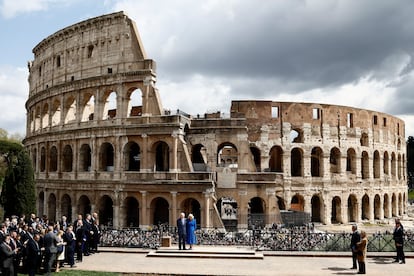For years it has been a recurring rumor in Rome, it was said that there was something strange in the sale of tickets to enter the Colosseum, the most visited monument in Italy, with 12 million tourists in 2023. Many times there was no way to buy them in the official portal, but were on other much more expensive tourist platforms. Finally, in 2023, the Municipal Tourism Advisor, Alessandro Onorato, made a video denouncing that the system was “doping”, damaged the image of the city and the competence guarantee authority opened an investigation. Result? It has just been fined with a total of 20 million euros to Coopculture, the company that had the granting of tickets between 1997 and 2024, and six tour operators (Tiqets International BV, Gethyourguide Deutchsland GmbH, Walks LLC, Italy with family, City Wonders Limited and Musement).
The company that managed the box office, fined seven million, “has contributed, with full awareness, to the phenomenon of the serious and prolonged unavailability of tickets for the colosseum at a basic price,” says the Italian authority. In addition, he accuses, “he has not adopted measures to face the hoarding of tickets with automated methods.” The investigation has concluded that the awardee of the service, which denies the accusations and has announced a resource, allowed these platforms to monopolize thousands of tickets through mass purchase programs and bots And then they were relieved more expensive, sometimes even twice the price.
The tickets were also incorporated into packages with guide, or with other visits to the city, or it was said that they benefited from the theoretician privilege of “jumping the line”, and the rate sometimes rose up to 100 euros (now the individual ticket costs 16 euros plus 2 of presale rights). The investigations have determined that a single company sometimes bought more than a thousand tickets in a few hours or made 65 interactions in a minute with the official sales portal, operations carried out “at speed that cannot reach a human being.” The affected companies have also denied that they commit these practices.
The result was that the tourist, after not finding tickets on the official website of the Colosseum, ended up resigning to buy them more expensive in other portals, all for not losing the opportunity to visit the famous monument in his few days in Rome. Or he went anyway to the place in the hope of acquiring them right there, where he was assaulted swarms from entrances and guides vendors that offered him his services. In summary, a parallel market designed to display the tourist, in an enclosure with the capacity to host 3,000 visitors simultaneously. In fact, the case began to appear in the media when professional guideline associations put themselves serious with the denunciation of the system.
But it also emphasizes the authority of the Italian competition, the coopculture society itself also reserved other input packages that could only be acquired together with didactic visits, more expensive and with which this firm earned more money. The company left the service in 2024, and in October 2023 a system of sale of nominative bills was launched, with the name and surname of the buyer, whose identity is checked when accessing the monument, which is currently in force and has ended the problem. The Ministry of Culture also extended the box office to buy tickets on-site and marked a limit of 25% of sales on the Internet for tour operators.

